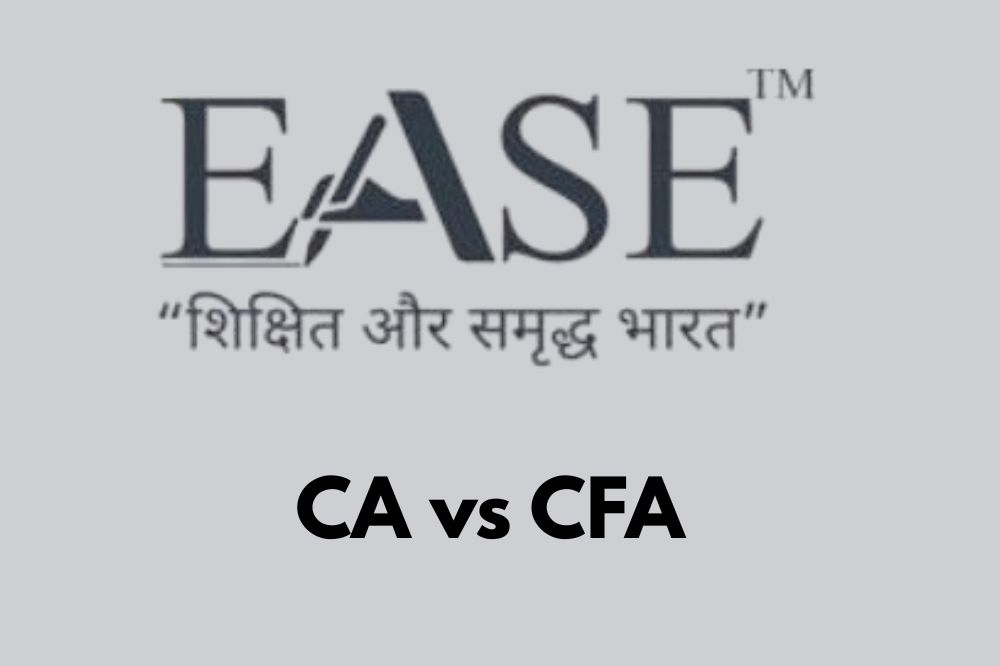If you’re a commerce student or finance enthusiast, you’ve probably wondered: Should I pursue CA or CFA? Both are prestigious qualifications, both promise high-paying careers—but they lead to very different destinations.
Let’s break it down with clear comparisons to help you choose the path that fits your goals.
What Is CA vs CFA?
| Feature | CA (Chartered Accountant) | CFA (Chartered Financial Analyst) |
|---|---|---|
| Governing Body | ICAI (India) | CFA Institute (USA) |
| Core Focus | Accounting, Auditing, Taxation, Compliance | Investment Analysis, Portfolio Management, Financial Strategy |
| Recognition | Highly valued in India | Globally recognized in finance hubs |
| Ideal For | Students interested in financial reporting, tax, and law | Students passionate about markets, investments, and global finance |
Course Structure & Duration | CA vs CFA
| Criteria | CA | CFA |
|---|---|---|
| Levels | Foundation → Intermediate → Final | Level I → Level II → Level III |
| Practical Training | 3 years of Articleship (mandatory) | 4 years of relevant work experience (for charter) |
| Average Duration | 4.5–5 years | 2–3 years (if cleared in first attempts) |
| Exam Frequency | Multiple times a year (India) | Twice a year globally |
Career Opportunities | CA vs CFA
| CA Career Roles | CFA Career Roles |
|---|---|
| Auditor | Portfolio Manager |
| Tax Consultant | Investment Banker |
| Financial Controller | Equity Research Analyst |
| CFO | Risk Analyst |
| Forensic Accountant | Wealth Manager |
🔍 CA is ideal for those who enjoy working with numbers, laws, and compliance. 📈 CFA suits those who thrive in financial strategy and market analysis.
Salary Comparison | CA vs CFA
| Experience Level | CA Salary (India) | CFA Salary (India & Global) |
|---|---|---|
| Freshers | ₹7–10 LPA | ₹6–12 LPA |
| Mid-Level | ₹15–30 LPA | ₹20–40 LPA |
| Senior Roles | ₹30+ LPA (CFO, Partner) | ₹50+ LPA (Fund Manager, VP Finance) |
💡 CFA salaries tend to spike in global finance roles and MNCs.
Global Scope | CA vs CFA
| Aspect | CA | CFA |
|---|---|---|
| Recognition | Primarily India | Global (US, UK, Singapore, UAE, etc.) |
| Mobility | Requires CPA/ACCA for global practice | Accepted worldwide without additional exams |
| Industry Reach | Accounting firms, corporates, government | Investment firms, banks, hedge funds, MNCs |
Skills You’ll Develop | CA vs CFA
| CA Skills | CFA Skills |
|---|---|
| Accounting standards & tax laws | Investment analysis & valuation |
| Audit procedures & compliance | Portfolio management & financial modeling |
| Regulatory frameworks | Strategic decision-making in finance |
Which One Should You Choose?
| Choose CA If… | Choose CFA If… |
|---|---|
| You enjoy accounting, taxation, and law | You’re passionate about finance and markets |
| You want to work in India or with Indian firms | You aim for global finance roles |
| You prefer structured compliance and reporting | You thrive in dynamic investment environments |
Final Thoughts | CA vs CFA
Both CA and CFA are rigorous, respected, and rewarding. The right choice depends on your interests, strengths, and career aspirations.
- If you love decoding balance sheets and tax laws, CA is your calling.
- If you dream of managing portfolios and analyzing market trends, CFA is your path.
Still unsure? Talk to professionals in both fields, explore internships, and reflect on what excites you more—compliance or capital markets.
❓ CA vs CFA: Frequently Asked Questions
1. Which is tougher: CA or CFA?
Both are challenging, but CA is considered tougher in India due to its low pass rates and mandatory Articleship. CFA is conceptually intense but more predictable if you follow a disciplined study plan.
2. Can I pursue both CA and CFA?
Yes, many professionals pursue both to expand their career scope. However, it requires strong time management and clarity on long-term goals.
3. Which has better global recognition?
CFA has wider global recognition, especially in finance hubs like New York, London, and Singapore. CA is highly respected in India but may require additional certifications abroad.
4. What is the minimum eligibility for CA and CFA?
- CA: After Class 12 (Commerce stream preferred)
- CFA: After graduation (or in final year of bachelor’s degree)
5. Which offers higher salary: CA or CFA?
At senior levels, both can earn ₹30–50+ LPA. CFA tends to earn more in investment roles and global firms; CA excels in corporate finance and compliance roles.
6. Is CFA useful in India?
Yes. CFA is increasingly valued in Indian investment firms, banks, and MNCs—especially in roles like equity research, portfolio management, and financial strategy.
7. Does CFA require Articleship like CA?
No. CFA does not require Articleship, but you need 4 years of relevant work experience to earn the charter.
8. Can a CA become a CFA later?
Absolutely. Many CAs pursue CFA to transition into investment banking, asset management, or global finance roles.
9. Which is better for government jobs?
CA has more relevance in government audits, PSU roles, and regulatory bodies. CFA is less common in government sectors.
10. Which one should I choose after Class 12?
Start with CA if you’re sure about accounting and taxation. Consider CFA after graduation if you’re drawn to finance, markets, and global investment roles.

